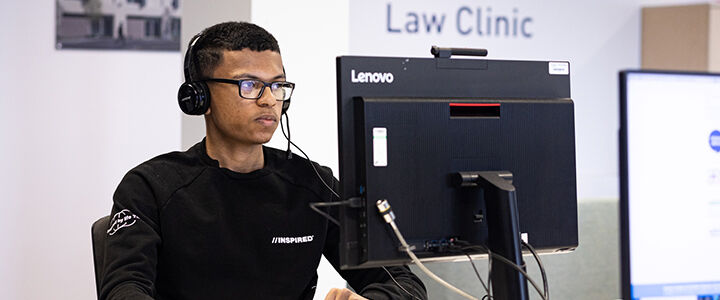Free Legal Advice

Free Legal Advice Service for our community
The Birmingham City University (BCU) Law Clinic is a confidential service offering advice on a wide range of legal issues to the local Birmingham community and more widely.
We bring together students, staff and in-house/ external lawyers to provide advice and assistance on a variety of legal matters.
All the BCU Law Students work under the supervision of qualified lawyers and/or practitioners.
Areas of law we cover
We offer free legal advice on a number of areas of law to those who are not eligible for legal aid and who cannot afford to pay. These include:
- Family
Cohabitation, separation, finances on separation, divorce, finances on divorce, child arrangements, domestic violence, fertility and modern families. - Housing
Disrepair, arrears, possessions and evictions. - Immigration
Immigration status, leave to remain queries, asylum applications, KIND- immigration issues relating to undocumented/ unaccompanied minors. - Welfare Benefits
Casework limited to PIP appeals. One off advice for other benefit related issues. - Employment
Equality and Sex Discrimination, harassment, unfair, wrongful and constructive dismissal. - Personal Injury
Accidents at work, road traffic accidents, accidents in public places, serious and life changing injuries, cycling and motorbike accidents, fatal accidents, accidents involving pedestrians and accidents involving defective products.
Who we work with
In order to provide these services we work with a variety of charities, organisations and businesses, including:
- Support Through Court
BCU students volunteer at the Birmingham Civil and Family Justice Centre in the STC offices. - Central England Law Centre (CELC)
Staff from the Birmingham CELC run a number of clinics including Welfare Benefits, Employment, Immigration and Housing supported by BCU Students. - Citizen's Advice
BCU works with Citizens Advice across the West Midlands, with student volunteers. - LawWorks
BCU partners with a number of private practice firms to offer family law advice shadowed by the students. - BCU Family law Clinic
BCU operates an in-house Family Law Clinic operated by Fiona Farrell in respect to matters that are pre, during and post-litigation. - Hodge Jones Allen
BCU partner with Hodge Jones Allen to run our Personal Injury Clinic. -
Street Law and Public Education
We deliver a number of Public Legal Education projects to primary , secondary schools and charities with the purpose of providing wider legal education, improving access and empowering communities with knowledge of legal rights and obligations.

Meet the team
Meet the key people behind the BCU Law Clinic, passionate about providing practical legal advice and support to our local community.
Meet the teamHow to access the Law Clinic
Find out how to access legal advice for each specific clinic, including opening hours and contact us details.
Get legal adviceYour questions answered
Find answers to the most common questions we're asked about the BCU Law Clinic.